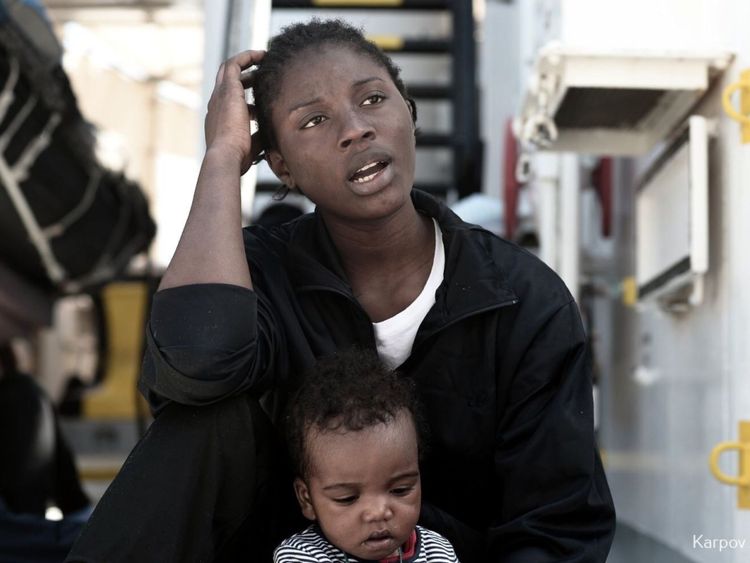Two ships carrying hundreds of people who have become the focus of a Europe-wide disagreement over migration have docked in Valencia.
The Italian coast guard vessel Dattilo arrived in the Spanish port just before 7am local time on Sunday, and was followed by the Aquarius migrant rescue vessel a few hours later.
An Italian navy ship, the Orione, will follow. The total number of migrants being transported is 630.
They were rescued a week ago off the coast of Libya and have been at sea ever since after the Italian government refused to allow the vessel they were aboard to dock in Italy.
Among those rescued are seven children aged under five, 32 children aged between five and 15 years, 61 young people aged from 15 to 17 and 80 women, seven of whom are pregnant.
Medecins Sans Frontieres (MSF) tweeted that a young mother aboard the Aquarius said she left Sierra Leona almost 11 months ago because she wanted to protect her baby girls against being circumcised.
“I tell them I don’t want to circumcise my children,” she said. “I went to the desert, to Libya and on the boat.”
:: Sky Views: The polarising impact of migration
The migrants were rescued in several different operations last weekend after Italian coastguard vessels reported a group of small rubber dinghies off the coast of Libya.
The Aquarius, a charity rescue vessel operated by MSF and SOS Mediterranee, picked up more than a hundred people in a complex night-time rescue before being asked by the Italian authorities to take on board hundreds more people they had recovered.
However the Italian interior minister, Matteo Salvini, then refused to allow the Aquarius to dock at Italian ports, fulfilling an election pledge to stop the arrival of migrants from Africa.
Malta also refused to allow them to dock there, arguing that the Italians had assumed responsibility for the rescue operations.
But the new socialist government in Spain said that the Aquarius would be allowed to dock in Valencia – at least a four-day voyage away.
The Italians then agreed to transfer back some of the migrants to two of their vessels which, with the Aquarius, set sail for Spain.
The debacle promoted a mid-week diplomatic spat after French President Emmanuel Macron accused the Italian government of “cynicism and irresponsibility” for refusing to take the Aquarius.
Italian Prime Minister Giuseppe Conte’s planned trip to Paris on Friday was briefly cancelled before Mr Macron clarified that he did not mean to offend Italy.
In Valencia, the Spanish Red Cross has set up a reception centre with more than 1,000 volunteers and 400 translators.
The authorities have pledged migrants will have specific translators assigned to them for the duration of their registration process which will last several weeks.
The 630 people, who are from countries across Africa, will need to claim asylum. Some will do this in Spain, but France has said that it will take some of them too.
Speaking in Valencia on the eve of their arrival, MSF president David Noguera said the plight of those on the Aquarius must prompt governments to rethink their migration policies.
“This obliges us all and mainly the European authorities and the countries of the European Union to rethink this model at once,” he said.
“It is unacceptable that after three or four years, we continue with these levels of suffering and mortality in this Mediterranean Sea, which has become the deadliest migratory corridor in the world.”
More than 23,000 people have reached European shores in 2018, with about 42% arriving in Italy from Libya and the remainder divided between Greece from Turkey (38%) and Spain from Morocco (20%), according to the International Organisation for Migration, the UN Migration Agency.
Europe has consistently failed to tackle the problem because it has been unable to stem the flow out of Africa or put in place an asylum and effective return policy which would see those not eligible for asylum sent home.
The situation has fundamentally altered politics across Europe with right-wing anti-immigration parties soaring in polls and securing positions in coalition governments in both Italy and Austria.
In Germany, the broad issue of illegal migration is threatening the collapse of Angela Merkel’s coalition, formed earlier this year.
Mrs Merkel, who allowed more than a million people into Germany in 2016, has clashed with her interior minister who has said migrants must be turned away at the border. The issue will be a key topic at a summit of EU leaders in Brussels later this month.
Speaking alongside Italy’s prime minister in Paris on Thursday, President Macron said: “The proper response is European, but the existing European response has not adapted.”
Mr Conte echoed his view, adding that the so called Dublin regulation which requires migrants to claim asylum in the first country they arrive in is no longer fit for purpose:
“The concept itself of the ‘state of first entry’ must be rethought,” he said.
“He who puts his feet in Italy puts his feet in Europe.”
Both leaders said Europe’s external borders must be made more secure and they floated the idea of EU-run asylum centres in African counties to deter migrants from making the journey illegally.
From – SkyNews








